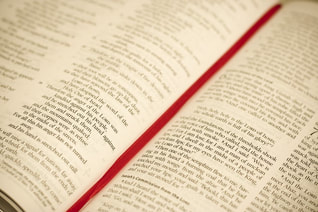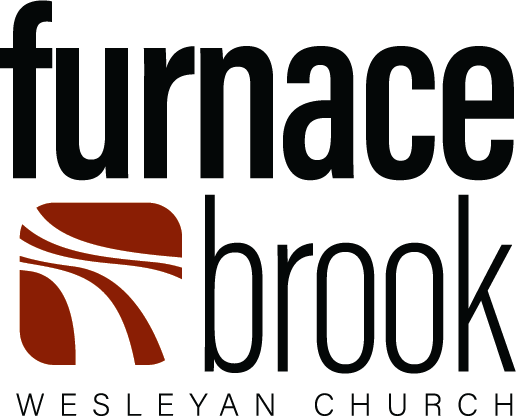 At Furnace Brook we take the Bible seriously. We also take it at its word, that it's the very Word of God. We take it to heart. In fact we take it pretty much everywhere . . . but church it seems. As a child I recall attending a church where, when the pastor told us to turn to a certain passage, the rustling of all the pages was the evidence of our shared piety. But things have changed, and it's not all bad. If fewer people bring their Bibles to church now there might be some good reasons for that. For one thing, people increasingly prefer the Bibles they keep on their phones or devices. For another thing, there are a lot of people at church who are so new to the faith that their libraries haven't caught up to their convictions yet. If you know a new believer, this is a great and thoughtful gift! But what if some of the absence of Bibles is really about complacency and indifference, after all, the words are going to be up on the screen, right? Or what if it's because of confusion about which version of the Bible is the "right" version. A church like ours is only going to be strong and truly growing to the extent that we are a people with a love for and a devotion to the Word of God. Five reasons to bring your Bible (electronic or paper) with you and to use it at church. 1. Keep the leaders accountable. It is amazing what mischief has been done by leaders who have "gone off the rails." Our rails are the Bible. Verify what you are hearing. 2. If you have a short attention span and you're prone to zoning out in church you can at least read your Bible. I once had someone tell me after a service that he had found the service unusually stimulating. He went on to explain that my sermon wasn't really doing it for him, so he had spent that time reading in 1 John. Coincidentally, his best service ever was my most humbling one, but I'm glad of both outcomes. 3. Using your Bible at church is good practice for using it in the world. A soldier who makes no use of the gun range will be of no use on the battlefield. 4. Anyone who sees you using your Bible in church will be encouraged by it. 5. Having your own Bible gives you the opportunity (whether you use it or not) to take notes and highlight passages. Of course, if you agree that you should bring a Bible with you to church you might still be baffled about which version of the Bible to use. Here are three things to keep in mind. What Bible Version Should I Use? 1. At Furnace Brook we typically use the NIV. It is widely accessible and is, perhaps, the most generic. If you want a Bible to use to follow along with the readings and the sermon. This might be your best bet. But a word of caution: there are things about the newest version of the NIV that we are not crazy about and it may not be our default translation in the future, so this would not be the reason for investing in an expensive NIV study Bible, for instance. 2. There are advantages to having a number of different versions of the Bible. I have a version that I prefer for when I'm reading to my children, a version that I prefer when preparing a sermon, and another version for when I'm doing personal devotions. The variety of translations do not compete with or detract from each other: they give the Word a greater sense of texture and depth. 3. When selecting Bibles keep in mind that all of them are on a scale from "transliterated" to "dynamically equivalent." Transliteration is word for word translation, and dynamic equivalence is when the translator takes liberty with things like sentence structure and vocabulary to convey the meaning better than a transliteration might. So, for instance, in the ancient Hebrew understanding of things the bowels, and not the heart, were the seat of human emotion (and that makes sense: we still feel things "in our gut.") A transliteration of Philippians 1:8 reads "For God is my record, how greatly I long after you all in the bowels of Jesus Christ," where a more dynamically equivalent, such as we find in the NIV, reads "God can testify how I long for all of you with the affection of Christ Jesus." There are benefits and drawbacks to each approach, but it's important to consider where a translation falls on that spectrum when selecting a version, and to avoid depending for everyday use on a version of the Bible that is very close to either extreme. If you have questions about selecting bible translation, please ask me and I'd be happy to advise you! In addition to bringing a bible to church, I encourage you to spend time in the word daily. If we are looking to become better disciples, it is important to understand our discipler, and what he teaches- truths which are found in the word. Joshua 1:8 "This book of the law shall not depart out of your mouth, but you shall meditate therein day and night, that you may observe to do according to all that is written therein: for then you shall make your way prosperous, and then you shall have good success.
1 Comment
Melissa Omand
11/9/2017 08:32:10 pm
The Bible is often symbolized as a sword in the Bible. Jesus answers/refutes the temptations and wiles of the devil with the scriptures. He needed to have the sword of truth in order to use it to overcome...how much more we who are not the Son of God? Reading one chapter a day will allow you to read the Bible in four years. Four chapters a day....one year. There are even apps for listening to the scriptures if reading is difficult or for a change of pace. I love to talk about the Scriptures and am almost always available to chat.
Reply
Leave a Reply. |
Furnace Brook Wesleyan Church Blog
|

 RSS Feed
RSS Feed